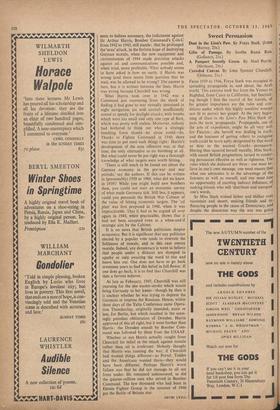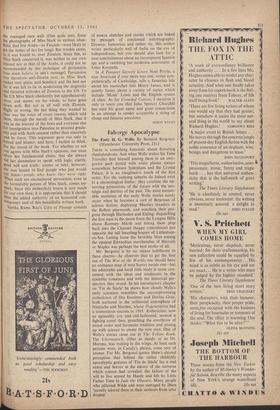Sweet Persuasion
FROM 1939 to 1946, Freya Stark was occupied in spreading propaganda in, and about, the Arab world. This exercise took her from the Yemen to Baghdad, from Cairo to California; but fascinat- ing though I find the record of her travels, of far greater importance are the rules and con- ditions under which this highly sensitive woman saw fit to purvey her gospel. At the very begin- ning of Dust in the Lion's Paw Miss Stark re- jects the term `propaganda.' Propaganda, one of the arts of expedience, might be all very well for Fascists : she herself was dealing in truth; and the business of getting others to recognise truth could be more aptly designated by that word so dear to the ancient Greeks—persuasion. Having thus squared herself morally, Miss Stark, with sound British pragmatism, turned to render- ing persuasion effective as well as righteous. The rules which she deduced are three : one must be- lieve in one's own message, one must ensure that what one advocates is to the advantage of the listeners as well as oneself, and one must lose no opportunity of exerting indirect influence, of making friends who will 'distribute and interpret' one's words.
So Miss Stark trotted hither and thither over mountain and desert, making friends and in- fluencing people in the cause of Democracy, and despite the disastrous way the war was going she managed very well. (One quite sees, from the photographs of Miss Stark in various situa- tions, that few Arabs—or Fascists—were likely to get the better of her for long). But trouble came, as it was bound to, over Zionism. Since this, as Miss Stark conceived it, was neither in our own interest nor in that of the Arabs, it could not be recommended by her technique of persuasion (one must believe in Qne's message). Persuasion Was therefore. anti-Zionist (not, as Miss Stark makes very plain, anti-Semitic); and the best use for it was felt to lie in moderating the dogmatic and frenzied attitudes of Zionists in the US. To the US Miss Stark obediently but apprehensively Went, and seems, on the whole, to have gone clown well. But not at all well with Zionists. Right or wrong, the last thing they wanted to hear was the voice of sweet reason, which told them, through the mouth of Miss Stark, that it for in the interest of the Jews and everyone else tor immigration into Palestine to proceed gradu- ally and with Arab consent rather than massively and by force. This argument gave rise only to hatred and bluster; and here, I incline to think, lies the moral of the book. For whether or not one agrees with Miss Stark's opinions, one must allow her fundamental claim, that she always 'lid her damnedest to speak with logic, clarity, good Will and truth : sooner or later, however, she was bound to find people who just would not listen—people who knew they were right. When such are encountered persuasion, even in the formidable person of Miss Stark, comes un- stuck. Since this melancholy lesson is very much 'L4 our own time, it is appropriate that it should have the added authority of an honoured con- temporary and of this beautifully written book.
Santha Rama Rau's Gifts of Passage consists
of essays, sketches and stories which are linked by passages of condensed autobiography. Dreamy, humorous and rather sly, this author writes particularly well of India on the eve of independence; but you should also look for a neat entertainment about an incompetent Spanish spy and a rambling but moderate assessment of ' Jomo Kenyatta.
In A Passport Secretly Green Noel Perrin, a nice American if ever there was one, writes sym- pathetically of Cambridge. tells a Jamesian tale about his researches into Henry James, and is quietly funny about a variety of topics which include 'Monk' Lewis and the English system of class. As for Crowded Canvas, I mention it only to warn you that John Spencer Churchill has used his great name and great connections in an attempt to render acceptable a string of cheap and fatuous anecdotes.
SIMON RAVI N







































 Previous page
Previous page